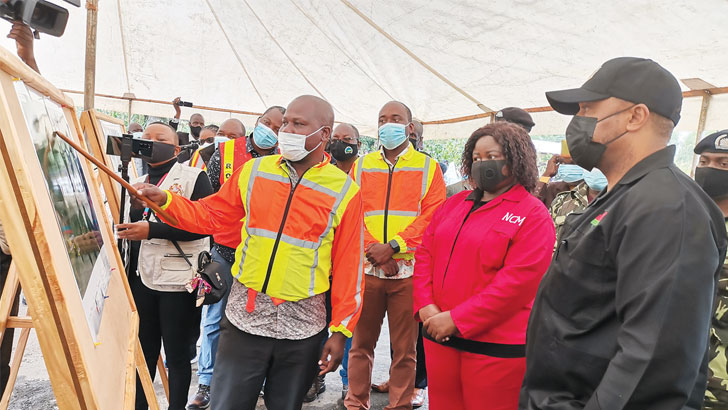Chilima demands quality on water
Vice-President Saulos Chilima has demanded quality on water projects in the country, saying Malawians have been duped long enough with substandard work.
He was speaking after touring two projects—Karonga Town Water Supply and Nkhata Bay Water and Sanitation costing $30.5 million and $26.7 million—respectively.
They are being implemented by the Northern Region Water Board (NRWB), while China Civil Engineering Construction Corporations is the contractor for the Nkhata Bay project.

Chilima first toured the Karonga project on Tuesday, but speaking yestersday after touring the project in Nkhata Bay, he observed that Malawians have long been on the receiving end of substandard work, which he said needs to change.
The Nkhata Bay project involves rehabilitating, upgrading and expanding the Nkhata Bay Town Water Supply System as well as solid and liquid waste management facilities to provide reliable and sustainable potable water and sanitation services.
He said: “We come out here so that we can monitor progress. We also want to understand challenges that are being faced so that we make sure that projects are delivered according to agreed schedule. In Nkhata Bay, we have been informed that it will be commissioned in November 2022, so let people have clean water by that time.
“As we work, there should also be better collaboration so that as we finish work, we deliver quality. The people of Malawi have been short-changed for a very long time, we deserve good quality. Therefore, we will be coming here before commissioning to see if quality is being sustained. We have responsibility to the citizens to deliver quality water.”
Just like in Karonga, where Paramount Chief Kyungu called for quality work, Senior Chief Mkumbira in Nkhata Bay said people in the area are longing for quality water.
He urged government to constantly monitor the project so that it is delivered with good quality.
On his part, the construction company deputy project manager Duan Haiwei assured that the works, which commenced on December 1 last year, will becompleted on time.
He said: “Despite the rains, which is a major challenge, we mobilised materials, equipment and personnel. We are hopeful of finishing on time in November 2022.
“Let me assure everyone that we have arranged a professional team, and we have the experience required. We have done similar work in Malawi and Zambia, so as a company we know what to do, and deliver the expected quality. We wouldn’t want government or people here to complain about our work.”
Among others, the Nkhata Bay Project, expected to benefit 150 000 households, involves upgrading the water treatment plant from 1 450 cubic metres (m3) a day to 20 000m3/day, transmission pipelines, distribution network by installing 122 kilometres (km) long pipelines and increasing storage tanks capacity by 8 050m3.
On the other hand, the sanitation component involves construction of a liquid waste treatment facility and solid waste dumpsite, procurement of liquid and solid waste collection and disposal vehicles, as well as conducting sanitation and hygiene promotion campaigns.
In October 2018, the African Development Bank Group approved a $15. 1 million grant from the African Development Fund for the project. While this only covers half of the estimated project cost, other funds will come from Opec Fund for International Development (a $12 million loan) and the Malawi Government ($3.45 million).
For Karonga, the extent of the new water supply system, whose design year is 2035, will extend up to Pusi (33km) north of Mlare/Ngala (24km) to the south (24km) and Mpata (6km) west.
The project is being funded $15 million by Opec Fund for International Development (Ofid), $10 million by the Arab Bank for Economic Development in Afrca (Badea) and $1.7 million by the Republic of Malawi and will be finished in 28 months. The project will increase access to potable water and improve health and sanitation for over 184 000 people






One Comment